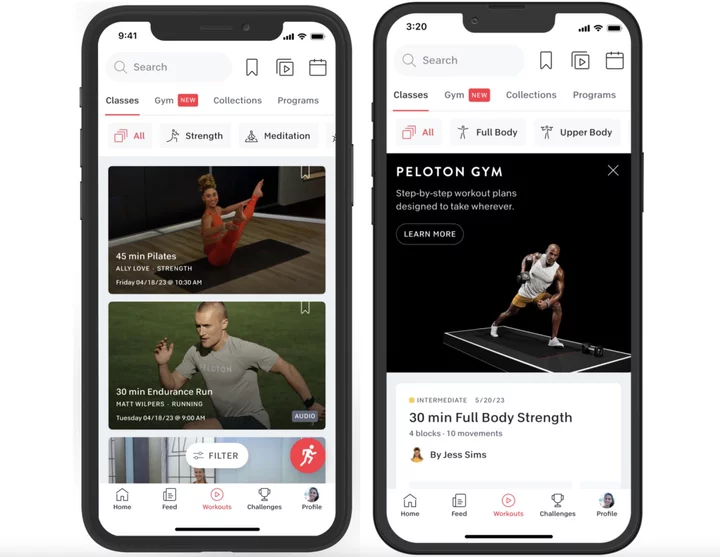Peloton Interactive Inc. is revamping its mobile fitness app to offer three different tiers, including an upscale version that will cost $24 a month, in a push to get more money from services.
In addition to the new high-end app, there will be a free version without live fitness classes, Peloton said Tuesday. They join the company’s existing service, renamed Peloton App One, which costs $12.99 a month. Peloton is also rolling out a new strength-training feature that’s available with all three of the tiers.
The move is an attempt to make the company less dependent on selling hardware — including the signature stationary bike that fueled much of its early success. The apps can deliver a wide range of fitness classes, and the company hopes to attract customers who might not be able to afford its pricey equipment. It’s also looking to dispel the notion that Peloton is an in-home experience, rather than something you can do anywhere.
Peloton had thrived during the early days of the pandemic, when stuck-at-home consumers turned its bikes into a prized commodity. But demand slumped after people began returning to the office and in-person gyms, leaving Peloton with a glut of inventory. Chief Executive Officer Barry McCarthy, a Netflix Inc. and Spotify Technology SA veteran, was brought in last year to turn around the company, and he’s made services revenue a bigger focus.
The New York-based company’s mobile apps let users take online fitness classes via smartphones, TVs, tablets and the web. They offer workouts for rowing, running, cycling, yoga and other categories, competing with Apple Inc.’s Fitness+, iFit and other digital training services.
The no-cost version, called Peloton App Free, will include over 50 classes across 12 fitness categories but no live courses. The hope is to lure customers with a free tier and then convince some of them to upgrade to pricier offerings.
The middle tier, Peloton App One, includes thousands of classes, but limits users to three classes per month that require hardware equipment. The high-end option, called Peloton App+, offers unlimited hardware-based classes. The new apps are launching in the US, Canada, Australia, Germany and the UK.
The services aren’t a substitute for the regular Peloton subscription that lets users get content directly on their bikes. The company hasn’t changed the pricing for its all-access plan, the $44-per-month option that is required for running classes on Peloton home equipment, including its bikes, treadmills, rowing machine and the Guide TV device.
The new strength-training service is called Peloton Gym and will offer workouts and video tutorials for exercising different parts of the body. The app can also detail which areas, such as the glutes or chest, were targeted and use an external heart rate sensor to gauge the number of calories burned.
Already, Peloton has begun to bring in more revenue from subscriptions than hardware. Services are also far more profitable than the company’s physical products. The company earned almost $290 million from subscriptions last quarter, while it lost over $17 million on its hardware.
Still, the company has also been losing app subscribers, with the numbers declining 13% last quarter compared with a year earlier. It’s hoping the revamped apps could reverse the trend.

